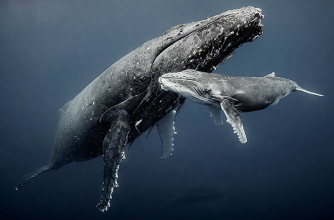 Whales are aquatic mammals belonging to the order Cetacea. The term 'whale' can be used in reference to any cetacean, including porpoises and dolphins, but in general it is applied only to those more than 3 metres long. Whales are the heaviest known animals, present or past, reaching maximum size in the blue whale at more than 30 metres and 200 metric tonnes. Large predatory whales, including the killer whale, are often considered to be apex predators, with no natural predators or enemies in their marine environments.  Whales are found in all of the world’s oceans. They are mammals, and they share the defining traits of that group: they breathe air, are warm-blooded, give live birth, suckle their young on milk, and have hair. All are entirely aquatic, but must surface regularly to breathe. Blubber serves as an insulating layer to protect small whales from hypothermia. Whales use sound to perceive their environment and to communicate, sometimes over great distances. Biologists have determined, for example, that the 10-Hertz sounds of Fin whales can travel over 1,800 km. Toothed whales can produce sounds and interpret their reflections via active echolocation.  Female whales are pregnant for about a year. The young are relatively large when born, one-third to one-half the length of the mother, and are able to swim at birth. They are nursed for about six months on extremely rich milk that can contain as much as 50 percent fat. A nursing Blue whale calf, for example, puts on about 80 kg a day. Females produce milk from the fat reserves under their skin. Whale mothers are protective of their calves and stay close to them for about a year.
Female whales are pregnant for about a year. The young are relatively large when born, one-third to one-half the length of the mother, and are able to swim at birth. They are nursed for about six months on extremely rich milk that can contain as much as 50 percent fat. A nursing Blue whale calf, for example, puts on about 80 kg a day. Females produce milk from the fat reserves under their skin. Whale mothers are protective of their calves and stay close to them for about a year.
Historically whales were hunted for whale oil and baleen. In the early 20th century, as demand increased and technology enabled meat to be frozen at sea, whales began to be taken in larger numbers for human consumption.  Concern over the increased catch led to the ratification of the International Whaling Convention and the founding of the International Whaling Commission in 1946. It instituted a moratorium on commercial whaling in the late 1980s. Some whaling still occurs under special permit. Native peoples are also allowed to continue traditional whale hunting that has been a part of their culture.
Concern over the increased catch led to the ratification of the International Whaling Convention and the founding of the International Whaling Commission in 1946. It instituted a moratorium on commercial whaling in the late 1980s. Some whaling still occurs under special permit. Native peoples are also allowed to continue traditional whale hunting that has been a part of their culture.
|